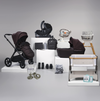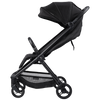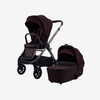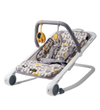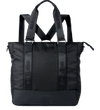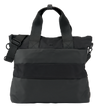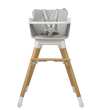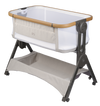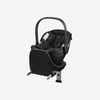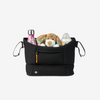From choosing the best baby changing bag to deciding how to decorate the nursery, there are a lot of things to think about when pregnant. But one of the most important issues to consider has to be how you’re going to feed your baby.
There’s no doubt you’ll feel overwhelmed by all the information out there. When advice gets passed on from your yummy mummy friend, your mother-in-law, or that nosy neighbour next door, it’s easy to get confused! That’s why we’ve prepared this simple and handy baby feeding guide to help you discover what’s best for you and your family.
Your new arrival will usually be ready to feed within the first hour of birth. Of course, it doesn’t stop there – they’ll continue to devour everything in your kitchen cupboards right up until they move out (we’re looking at you, teenagers!). But to help get you ready for the early stages, we look at what you should be feeding your little one from 0-12 months.
Remember, every baby has their own personality and will develop their own eating habits. This guide can help, but won’t worry if your little one doesn’t want to progress as quickly as others. Infants will let you know when they’re ready to sit in their baby feeding chair and eat solid food. If you’re concerned, have a chat with your GP and they’ll be able to offer their support.
The Age-by-Age Baby Feeding Guide
Begin with Breast Milk or Formula: 0-3 months
Newborn babies have tiny tummies, so need to be fed often in their first few months. Their stomach isn’t ready for solid food just yet. Babies get all the nutrients they need from breast milk or formula – you don’t need to feed them anything else for the first six months.
Research does show that breastfeeding is better than formula milk for a number of reasons. Breast milk is made just for your baby, and can build a unique bond between you and your infant. It also offers health benefits for you and your little one by reducing the risk of illness for you both.
Of course, not everyone prefers breastfeeding and you can use formula if necessary. Don’t worry if you’re having difficulties feeding at first – your GP will be able to help if you’re having problems.
Either way, your baby feeding time will be between 10-15 times a day. It’s a full-time job for new parents and means getting up every few hours, even during the night.
Baby’s Getting Hungry: 3-6 Months
When your baby’s 3-6 months old, you should still be feeding them breast milk or formula only. You’ll now have a regular feeding pattern with your infant and they’ll expect to bed fed at consistent times.
Babies tend to start getting hungrier at this stage and will be gaining weight gradually. Your little one will likely start crying (loudly!) for milk and will make it clear when they’re ready to be fed.
Starting on Solid Food: 6-9 Months
Baby feeding between 6-9 months means you can start introducing solid foods into their diet alongside their breast milk or formula. Look out for signs your little one's ready:
1) Babies can pick up food and feed themselves independently
2) They can hold their head and sit up without help in a baby high chair
3) Food can be swallowed easily
If your infant starts demonstrating this behaviour after the six-month mark, pop them in their baby chair and get ready for mealtimes with your youngster.
Mashed up veggies like white or sweet potato, carrots and parsnips, or mushed-up cooked fruit including peaches, apples and pears are a great place to start for early baby feeding.
When your little one can confidently hold food in their fist, give them soft bitesize pieces of banana so they can learn to chew. Over time, you’ll learn your baby’s able to enjoy more foods like puréed meat and fish (with all bones carefully removed), mashed hard-boiled eggs, baby cereal, pasta, toast and yogurt.
Introduce new foods one at a time, waiting a few days before giving them something new. Make sure to seat them comfortably in a baby feeding chair during mealtimes, so you can easily clean up inevitable crumbs!
Remember, your baby still needs breast milk or formula during this time. You’re able to give them sips of water with meals too.
Preparing for Three Meals a Day: 9-12 Months
Between 9-12 months, your little one will be sitting upright in their baby high chair, enjoying three regular meals per day. Give them a varied diet that includes:
· Cooked mashed-up fruits and vegetables
· Protein-rich foods like meat, fish, eggs and beans
· Starchy foods such as pasta, potato, rice and bread
· Dairy products like yogurt and soft cheese
Little ones like finger foods you can lay out on their baby chair tray, so you can enjoy mealtimes while encouraging their development. They should be able to securely hold bitesize snacks and eat some things independently.
Baby feeding at this stage should still include breast milk or formula.
Holy Cow! (Milk): 12+ Months
Once your baby’s 12 months old, they’ll be eating a range of foods and will continue to need three meals a day. But your infant can now drink whole cows’ milk.
In the earlier stages, cows’ milk won’t give your baby the nutrients they need. This changes once they turn one year old. You can keep breastfeeding during baby feeding time, but they’ll need the fat, vitamins and energy from whole cows’ milk to promote healthy growth and development.

